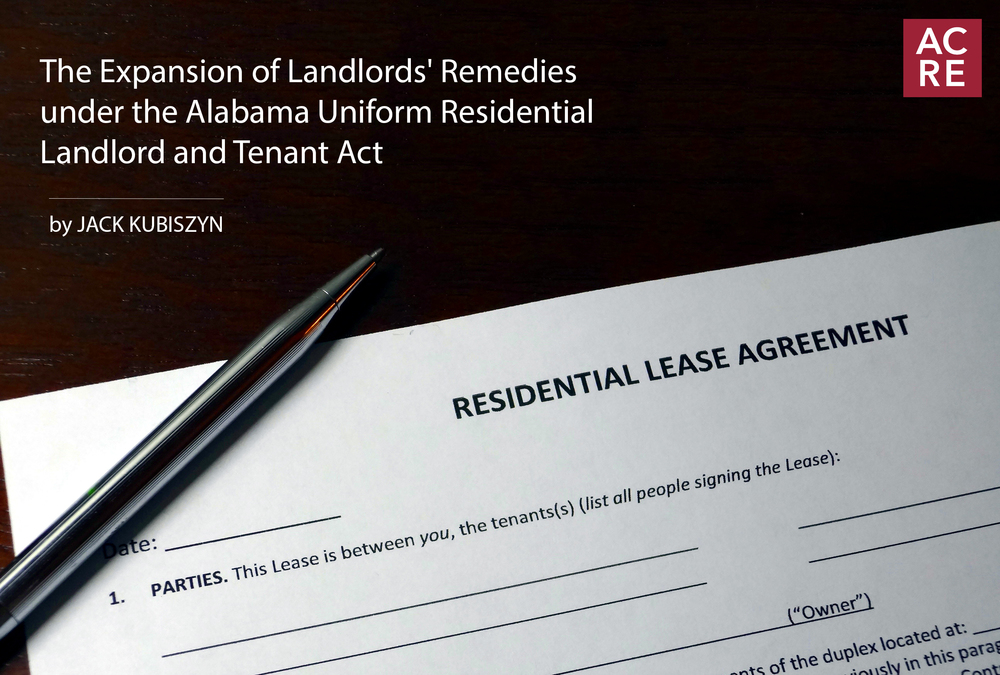In the most recent legislative session, the Alabama Legislature passed an Amendment to the Alabama Uniform Residential Landlord and Tenant Act (the “Act”) that grants landlords the ability to more easily terminate a lease with a tenant[1]. Previously under the Act, a landlord was required to provide a tenant notice of termination (the “Termination Notice”) if there was a material noncompliance with the lease agreement on the part of the tenant, such as the failure to pay rent. The Act required the Termination Notice to be in writing and to:
- specify the conduct causing the breach of the lease agreement[2]; and
- specify that the lease agreement will terminate on a date not fewer than seven business days from receipt of the Termination Notice if the breach is not remedied during this time period.
It is important to note that under the Act, the tenant had the right to remedy the noncompliance – that is, if during the seven-day period set forth in the Termination Notice the tenant cured or corrected the conduct alleged by the landlord, then no default existed and the lease agreement continued. The Act did limit the tenant’s right to cure such defaults to a maximum of four times during any 12-month period. The Act further provided that certain acts by a tenant were not curable. Specifically, intentional misrepresentations of a material fact in a lease or lease application, possession or use of drugs on the property, or the discharge of a firearm could not be cured, and a landlord had the absolute right to terminate the lease agreement upon seven-day notice.
The amendment to the Act now gives a landlord additional termination rights in addition to those currently existing. The right to terminate the lease agreement upon a seven- day notice without any right to cure has been expanded to include the following:
- Manufacture, cultivation, importation, transportation, possession, furnishing, administering, or use of illegal drugs in the dwelling unit or in the common areas;
- Illegal use, manufacture, importation, possession, furnishing, or discharging of a firearm or firearm ammunition on the premises of the rental property, except for the use or discharge of a firearm or firearm ammunition in cases of self-defense, defense of a third party, or as permissible in section 13A-3-23; and
- Criminal assault of a tenant or guest on the premises of the rental property, except in cases of self-defense, defense of a third party, or as permissible in Section 13A-3-23.
Moreover, the Act now provides that, in regard to a curable default, if a second breach of the lease occurs within six months of the prior breach and such subsequent breach involves “substantially the same acts or omissions as a breach for which a notice to terminate has previously been provided for by the landlord and cured by the tenant,” then tenant has no right to cure. For example, if a tenant fails to pay rent for a second time within a six-month period and the landlord sent a Termination Notice after the first event, then this situation will be treated similarly to the situation involving drugs or firearms, and there is no right to remedy the default by the tenant.
The Amendment to the Act clearly grants a landlord greater rights to terminate residential leases moving forward and allows a landlord to more easily remove a tenant causing trouble as a result of drug or gun use on the property. However, tenants will have to be more vigilant to make sure that a curable default of the lease agreement does not happen twice in a six-month period. Otherwise, the right to remedy the default and keep the lease in effect may no longer be an option for a tenant.
[1] The legislation is currently before the Governor to sign into law.
[2] If the breach of the Lease Agreement is the failure to pay rent, the Termination Notice should also include the amount of rent and any late fees owed.
About Christian & Small LLP
Christian & Small LLP represents a diverse clientele throughout Alabama, the Southeast and the nation with clients ranging from individuals and closely held businesses to Fortune 500 corporations. By matching highly experienced lawyers with specific client needs, Christian & Small develops innovative, effective and efficient solutions for clients. Christian & Small focuses on the areas of litigation and business and is a member of the International Society of Primerus Law Firms and the only Alabama member firm in the Leadership Council on Legal Diversity. Please visit www.csattorneys.com for more information, or contact Jack (jjkubiszyn@csattorneys.com) directly via email.





